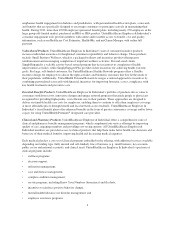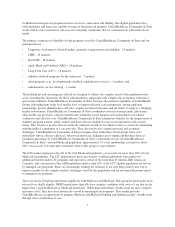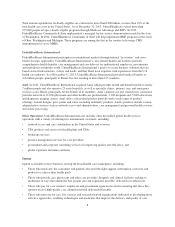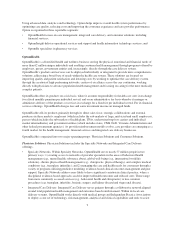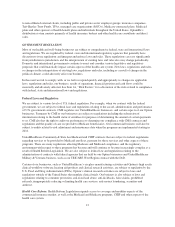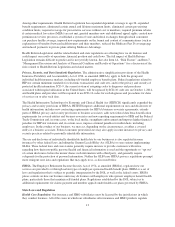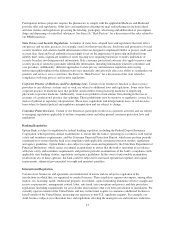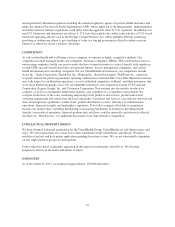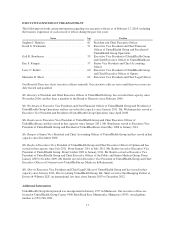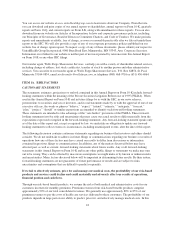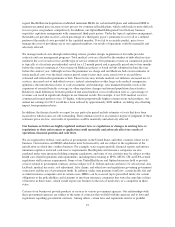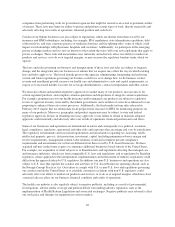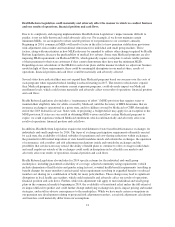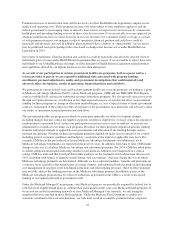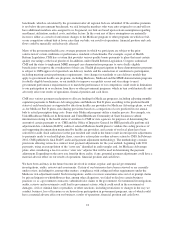United Healthcare 2013 Annual Report Download - page 16
Download and view the complete annual report
Please find page 16 of the 2013 United Healthcare annual report below. You can navigate through the pages in the report by either clicking on the pages listed below, or by using the keyword search tool below to find specific information within the annual report.those products and operations. These states require periodic financial reports and establish minimum capital or
restricted cash reserve requirements. The National Association of Insurance Commissioners (NAIC) has adopted
model regulations that, where implemented by states, require expanded governance practices and risk and
solvency assessment reporting. Most states have adopted these or similar measures expanding the scope of
regulations relating to corporate governance and internal control activities of HMOs and insurance
companies. The NAIC also established the Risk Management and Own Risk and Solvency Assessment Model
Act that by 2015 will require us to conduct additional group solvency assessments, maintain a risk management
framework and file additional reports with state insurance regulators. Certain states have also adopted their own
regulations for minimum MLRs with which health plans must comply. In addition, a number of state legislatures
have enacted or are contemplating significant reforms of their health insurance markets, either independent of or
to comply with or be eligible for grants or other incentives in connection with Health Reform Legislation, which
may affect our operations and our financial results.
Health plans and insurance companies are regulated under state insurance holding company regulations. Such
regulations generally require registration with applicable state departments of insurance and the filing of reports
that describe capital structure, ownership, financial condition, certain intercompany transactions and general
business operations. Some state insurance holding company laws and regulations require prior regulatory
approval of acquisitions and material intercompany transfers of assets, as well as transactions between the
regulated companies and their parent holding companies or affiliates. These laws may restrict the ability of our
regulated subsidiaries to pay dividends to our holding companies.
Some of our business activity is subject to other health care-related regulations and requirements, including PPO,
MCO, utilization review (UR), or TPA-related regulations and licensure requirements. These regulations differ
from state to state, and may contain network, contracting, product and rate, and financial and reporting
requirements. There are laws and regulations that set specific standards for delivery of services, appeals,
grievances and payment of claims, adequacy of health care professional networks, fraud prevention, protection of
consumer health information, pricing and underwriting practices and covered benefits and services. State health
care anti-fraud and abuse prohibitions encompass a wide range of activities, including kickbacks for referral of
members, billing unnecessary medical services and improper marketing. Certain of our businesses are subject to
state general agent, broker, and sales distributions laws and regulations. Our UnitedHealthcare Community &
State and certain Optum businesses are subject to regulation by state Medicaid agencies that oversee the
provision of benefits to our Medicaid and CHIP beneficiaries and to our dually eligible (for Medicare and
Medicaid) beneficiaries. We also contract with state governmental entities and are subject to state laws and
regulations relating to the award, administration and performance of state government contracts.
Guaranty Fund Assessments.Under state guaranty fund laws, certain insurance companies (and HMOs in some
states) doing business in those states, including those issuing health, long-term care, life and accident insurance
policies, can be assessed (up to prescribed limits) for certain obligations to the policyholders and claimants of
insolvent insurance companies that write the same line or lines of business. Assessments generally are based on a
formula relating to premiums in the state compared to the premiums of other insurers and could be spread out
over a period of years. Some states permit member insurers to recover assessments paid through full or partial
premium tax offsets.
Pharmacy Regulation. OptumRx’s mail order pharmacies must be licensed as pharmacies in the states in which
they are located. Our mail order pharmacies must also register with the U.S. Drug Enforcement Administration
and individual state controlled substance authorities to dispense controlled substances. In addition to the laws and
regulations in the states where our mail order pharmacies are located, laws and regulations in non-resident states
where we deliver pharmaceuticals may also apply, including the requirement to register with the board of
pharmacy in the non-resident state. These non-resident states generally expect our mail order pharmacies to
follow the laws of the state in which the pharmacies are located, but some states also require us to comply with
the laws of that non-resident state when pharmaceuticals are delivered there. Our mail order pharmacies maintain
certain Medicare and state Medicaid provider numbers as pharmacies providing services under these programs.
14


